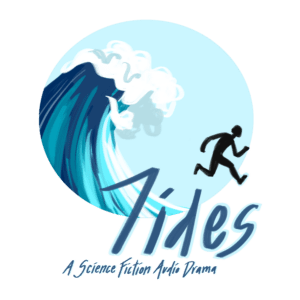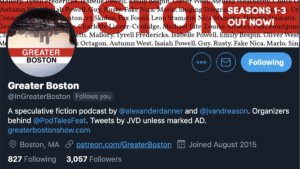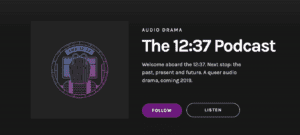If you’ve heard it once, you’ve heard it a thousand times: You have got to market your podcast. When you’re knee-deep in your second round of editing and trying to harness the power of that sound library you found last night at three in the morning, the prospect of navigating through setting up and curating a social media account is daunting.
Luckily, you don’t have to suddenly master all seven major platforms like they’re each part of the key to finding the lost treasure and saving the kingdom. Instead, you can put this list of tips and tricks into your back pocket and go on a brief and illuminating adventure into the world of social media, so you can pick the platforms that work best for you and your podcast.

Technical Tips
These are some ideas on what to do with your socials and how to do it, from setting it up to finding a community.
1. Lock down your social media early. As soon as you have a title for your podcast, find a social media handle (username) that you can use across all your platforms. Try your best to use the same one and not change from platform to platform because consistency is key to help people find you. It makes it easier, with the potential for humor, to say on podcast something like: “You can find us at horsehoops everywhere. Except Twitter, where it was banned, so we’re horse_hoops.” (HORSE).

2. Present your podcast wisely. People read profile blurbs, so drill down into what makes you special and interesting. Don’t rely on “a podcast where friends chat about pop culture.” It’s tempting because social media profiles usually have a small word or character limit, but get specific. Then you can do things like: “A queer brown podcast about sex, identity, culture, & reading. ‘Like NPR, on poppers.’” (Food 4 Thot)

3. Choose who you follow judiciously. Your list will dictate your home feed, from which you can interact, signal-boost, and curate. Find the accounts of podcasts you know and love, some critics or journalists you enjoy reading things from in the field, and any other accounts that are somehow relevant to your podcast. For instance, Tides, a fiction podcast about a marine xenobiologist, follows accounts of professional marine scientists and science centers.

4. Hashtags are your friends, but use them precisely. Do research as to whether your niche communities have an active podcast hashtag, and how it’s used (misusing a hashtag is a huge faux pas). Keep in mind hashtag culture varies by platform, so check out what your fellow podcasters are doing if you've got doubts. Twitter's got a really strict character count, so don’t put a huge slew of hashtags on your tweet; save that space for your own words. Instagram has a hashtag limit, but it's usually influencers and advertisers who max out. Tumblr has an entire culture built around complicated and funny hashtags. Some examples: the fiction community uses variations on #AudioFictionLove for when they want to shout-out love to another podcast; Berry of the Podcasts in Color directory spearheads the #podsincolor hashtag to support and share podcasts created by people of color.

5. Keep to a consistent posting schedule. This is more for you than for your audience because creating a schedule and sticking to it will help you prevent burnout. Running multiple social media accounts — or even just one fairly active account — can be a pain and it can get complicated, and even vicariously traumatic depending on what kinds of accounts you follow.

Etiquette Tricks
Probably one of the easiest ways to falter in marketing is failing at basic social media etiquette, or following rules and advice that are more in line with large corporations and businesses instead of independent artists.
1. Don’t leave a drive-by podcast link. Probably one of the most annoying things on social media is the unasked for link to a podcast on completely irrelevant tweets. The second most annoying thing is a podcast link with no description. They come across as lazy and disrespectful. Instead, when leaving your podcast link somewhere, make sure that 1) someone asked for a podcast recommendation and 2) that it’s relevant to whatever they’re looking for.
2. Don’t use lists of handles. I can guarantee that all people do when you list a bunch of handles for any reason (as recommendations, or to catch their attention), people just mute the conversation and move on. If you want to recommend podcasts, pick a couple and describe them and what you like about them. That kind of attention to detail will drive engagement with your own work.
3. Don’t slide into anyone’s DMs (direct messages). Only go into DMs when invited to do so, or if you have a substantial question that isn’t “Have you listened to my podcast?”
4. Engage honestly, and encourage engagement. Don’t just talk about yourself; talk about the podcasts you love and recommend. Listen to podcasts in your field and talk them up and be as excited about your community’s achievements as you are about your own.
5. Stay on theme and on brand. Your podcast’s social media account is not your personal account, so remain courteous and professional. Make sure to know what kind of content you want to curate for your account. For instance, the Spirits accounts retweet and reblog all kinds of mythology-related content and haunted places that are related to in-jokes in their podcast.

Some Platforms, and What They’re Best For
1. Twitter has one of the highest concentrations of active and producing podcast accounts. It’s also where a lot of current journalism and critics do a lot of theory work and post article links. This is where sharing content from other people you follow does a lot of work for you, without needing to create original content. People also use Twitter to keep up with the news and curated content, so use Twitter to post every time an episode comes out! Greater Boston curates an excellent Twitter feed that includes news and updates about the real world Boston, especially when it comes to their transit system.

2. Instagram is another platform with a lot of podcast listener and creator traffic, which seems baffling initially since it’s a heavily visual-based medium. Use Instagram to give behind-the-scenes peeks, live videos, photos or other visual media that exemplifies your brand. Best of all, we have audiograms now, and that’s perfect for Instagram when you’re announcing a new episode. There are a lot of communities on Instagram that don’t have as much traction on Twitter, so do your research for your podcast niche. Check out The Far Meridian’s Instagram; they make great use of it with beautiful photographs for their #FarAwayFridays.

3. Facebook‘s primary resource at the moment for podcasters is groups, which help promote in-depth discussions and events. If your podcast has a lot of material for people to dig their teeth into or you want to host a lot of local events, you may get a lot of mileage out of Facebook groups. Facebook’s audience is trending towards older ages, so remember that if you’re looking to connect mainly with people under the age of 25 or 26, you should seek a different central platform. The Write Now podcast has an incredible Facebook community where writers support one another through their triumphs and turmoils.

4. Tumblr is a blogging platform for sharing an aesthetic and specific topics of interest, and it’s a key platform for reaching a supportive fandom base. There are few limits as to what you can post, and as long as you find your niche, you can cultivate a great corner for yourself, your listeners, and your fellow podcasters. Tumblr’s audience trends younger in comparison with Facebook. Tumblr can also power your main website, like The 12:37 has done.


If you only take away one key piece of advice when it comes to social media for your podcast, it should be this:
Use social media for its intended purpose: to be social. I’d like to simply encourage you to not isolate yourself in a bubble of self-promotional advertising and shouting into the void. By making considered decisions and fostering connections, you can help yourself and your listeners discover a wider community.



Join the Movement